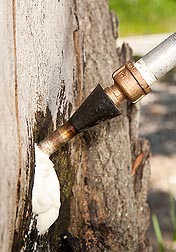This page has been archived and is being provided for reference purposes only. The page is no longer being updated, and therefore, links on the page may be invalid.
| Read the magazine story to find out more. |
|
|
Beneficial Fungi Examined for Battle against Destructive Beetles
By Jan SuszkiwAugust 26, 2013
An experimental foam containing insect-killing fungi is being tested by U.S. Department of Agriculture (USDA) scientists in the fight against ambrosia beetles, wood-boring pests that threaten the nation's $322 million avocado crop.
Scientists with USDA's Agricultural Research Service (ARS) in Peoria, Ill., and New Orleans, La., originally developed the foam as a way to pump fungal spores into the galleries of Formosan subterranean termites, which can nest deep inside trees. Now, together with university collaborators, the ARS researchers are testing the fungal foam's effectiveness against ambrosia beetles in orchard-scale trials with avocado trees.
In Miami-Dade County, Fla., avocado growers are contending with Xyleborus glabratus Eichhoff, the redbay ambrosia beetle. In California, particularly Los Angeles County, the fight is against a different ambrosia beetle species, the polyphagous shot hole borer, Euwallacea sp. The two states are the nation's leading avocado producers.
Both beetles tunnel into the sapwood of avocado trees, inoculating them with pathogenic fungi in the process. Redbay ambrosia beetles spread Raffaelea lauricola, the fungal culprit behind laurel wilt disease, which is lethal to avocado and other trees. The shot hole borer is associated with Fusarium species that cause Fusarium die-back.
Spraying avocado groves with insecticides to kill the beetles before they inoculate trees with the fungi may not be an effective disease management approach in this particular case, notes Alejandro Rooney, who leads the Crop Bioprotection Research Unit at the ARS National Center for Agricultural Utilization Research in Peoria.
As an alternative, Rooney's team will evaluate the effectiveness of treating avocado trees (and ornamental trees such as box elder, which serve as host reservoirs for the pest) with foam containing spores of Metarhizium, Isaria, Beauveria or other entomopathogenic (insect-killing) fungi. Vegetable oil-based formulations of the fungi will also be used.
In lab studies, the team devised tests called bioassays to genetically confirm the ability of the fungi to infect and kill the beetles, in addition to visual proof in the form of moldy growth on the pests' bodies. In those tests, more than 95 percent of beetles exposed to the fungi died. Preliminary field trials under way in California also are providing promising results thus far.
Read more about this research in the August 2013 issue of Agricultural Research.
ARS is USDA's principal intramural scientific research agency.

